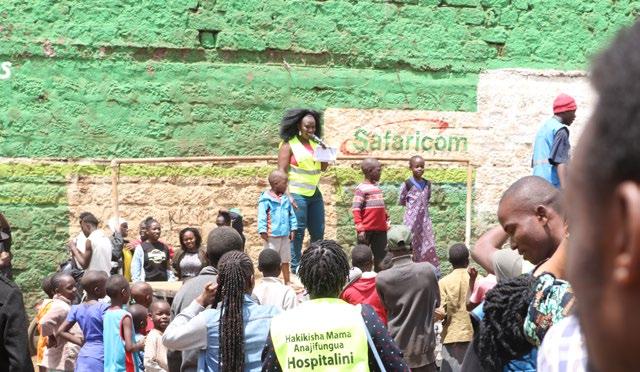
2 minute read
Meaningful Youth Engagement and knowledge sharing in SRHR
from Editorial Design
by Ben Kanyi
SRHR Alliance Kenya Newsletter 2020
Advertisement
Meaningful youth engagement and knowledge management has become a key instrument for decision making, creating, identifying and sharing knowledge within personnel in Nairobits Trust.
Knowledge management and meaningful youth engagement has been a useful means for the organization to improve knowledge sharing among the peer educators and the staff. For the implementation of this practice, high quality documentation has been key in programing. This is clearly demonstrated when peer educators and young staff members are not able to correctly and efficiently use data gathered to influence the current or future programming.
For the adoption of knowledge management different strategies have been used. This includes; ss peer educators interactions through different modes such as e-interactions (by use of WhatsApp), face to face during review meetings or through reports with each other they share knowledge they have gathered from meetings, forums or conferences. This has shown the competence of the peer educators to converse on SRHR issues. Secondly there is the capacity building sessions and apprenticeship through which peer educators have been able to undergo trainings such as on fundraising, exposure visits to steer exchange learnings documentation and on-job trainings. Through these models peer educators were able to obtain, improve, and retain the skills learnt and knowledge to do their jobs competently. This culture has helped in cascading the goal of the Get Up Speak Out project to the youth, adolescents and the community at large. The three pillars that have been used to successfully adopt knowledge management at Nairobits include leadership, capacity building and learning.
Motivation and turnover have been a challenge in knowledge management Especially getting peer educators who are not motivated to share their work and ideas in a shared space to address this, Nairobits adopted a culture of respect to learning and improving and created spaces of sharing and change thereby creating a safe space for the peer educators to openly share with each other. Secondly, as turnover is unavoidable, and sometimes the responsibilities tied to a community can fall through the cracks, keeping a detailed record or booklet of the tasks by each peer educator involved has kept knowledge running smoothly within the organization and externally.
This process was spearheaded through leveraging on technology to ensure that there was the backup and constant update of information by peer educators thus ensuring that there is comprehensiveness of information especially by young people, community and all other relevant stakeholders.
This strategy has helped the organization in visibility and recognition with the Nairobi County government/community especially on youth engagement in SRHR and community voices as records of activities are constantly shared with the county and the community for the ownership of the programming.
To share I will learn… and to learn I need to listen…”
Rachael K.
A NairoBits peer educator sharing information in the peer educators WhatsApp group after a meeting.










